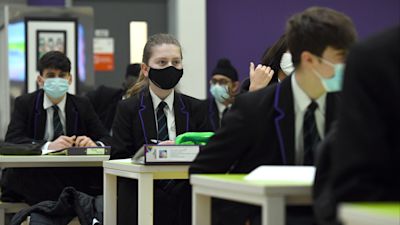'Our elderly have been protected from Covid but often our youngest have been forgotten'

With Covid-related pupil absences growing, the impact of the pandemic on children has often felt all but forgotten, ITV News Correspondent Rachel Younger reports
This is a pandemic that was meant to hit the elderly hardest and the Covid death toll tells its own heartbreaking story.
But the impact on children has often felt all but forgotten by a government which has repeatedly taken its eye off the ball when it comes to education.
The latest figures show around one in 20 pupils in English state schools are currently absent - about 375,000 pupils.
The numbers are up around 100,000 from last week and have been soaring recently due to the spike in Covid infections across the country.
Young people and schools have had to cope with repeated u-turns on exams, mask wearing and testing.
Exhausted headteachers tell me how they’ve spent untold hours trying to implement last minute changes in policy.
The headteacher of a school in Oldham discusses the impact current rules are having on their pupils' education
Often, vital information has arrived in their inbox just as schools have been about to break up for holidays.
But if teachers have struggled, the impact on children’s mental health is huge.
In some areas of the country, there are pupils who have spent more of the past academic year outside of school than in.
And with much of life beginning to return to normal over the past few months, schooling has been anything but, as the figures on pupil absences show.
In some local authorities there have been small pilots allowing pupils to be tested in the classroom every day rather than isolate if someone in their year group bubble tests positive.
But schools have been given little flexibility by government guidelines that otherwise insist on entire year groups being sent home after just a handful of positive cases.
With Covid numbers rising steeply again there is a fine balance between protecting public health and maintaining children’s education.
But isolation also puts enormous pressure on families struggling to cope with childcare, home schooling and feeling trapped at home.
In Oldham, where infection rates mean schools have been particularly badly hit, Children’s Social Care and Early Help Services have seen referrals spike by 46% over the past 12 months.
Listen to our coronavirus podcast:
Over the past week, I’ve spoken to numerous parents at their wits' end because their children are repeatedly being sent home after a positive test amongst their year group.
One mum wept as she told me that since September, she’s had to miss eight weeks of work because her three children have repeatedly had to isolate.
After using up all of her leave entitlement, she is now having to take time off unpaid.
Her family is now relying on credit card debt to pay the mortgage but that's not what hurts the most.
While she’s managing to cling onto her job, her children, like so many others, will never get back the learning they’ve missed - let alone the leaving ceremonies, school plays and sports days that are gone forever.
In England, there are now just three weeks to go before schools break up.
Both parents and teachers need decisive government action, swiftly and clearly communicated, to avoid the disruption of a third academic year for children who’ve already missed so much.